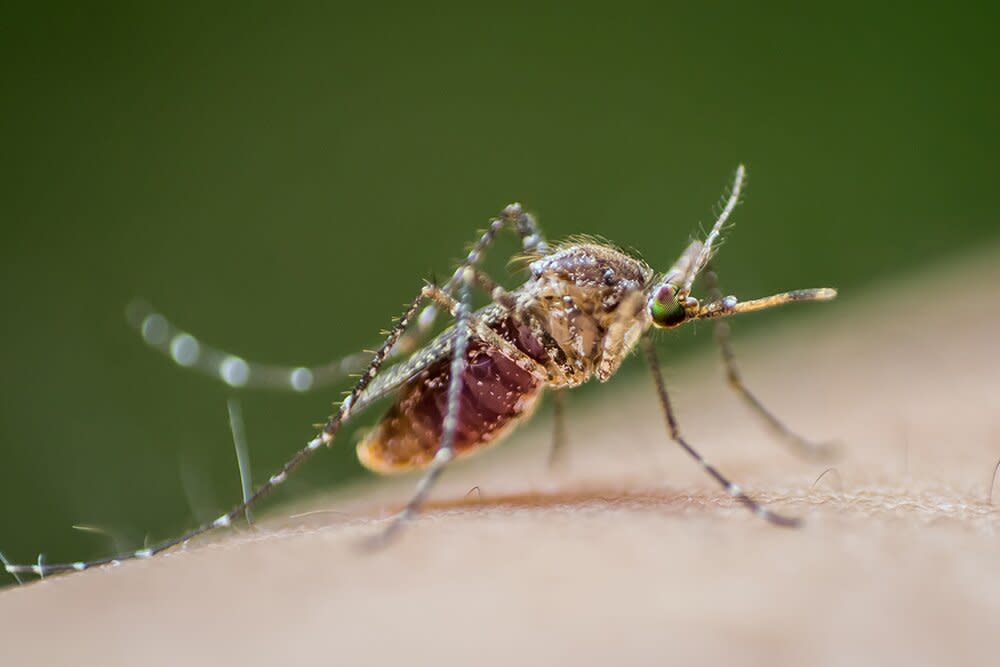What is Skeeter Syndrome in Kids?

Shutterstock
Warm weather usually brings a less enjoyable companion: mosquitoes. For most people, mosquitoes are simply a nuisance that comes with summer, and bug spray can help you enjoy time outside without too much worry. But on rare occasions, mosquitos can spread diseases like Zika, West Nile virus, and malaria—yikes!
Plus, while most kids just get a tiny bump from a mosquito bite, others suffer from red, swollen, and itchy rashes that might need treatment. This condition is called "skeeter syndrome," and it's actually an allergic reaction to proteins in mosquito saliva. Here's everything you need to know about this relatively rare summertime malady.
What is Skeeter Syndrome?
If you've never heard of skeeter syndrome, you should know it's a very real thing that affects kids and adults alike. This funny-sounding term is used to describe a severe allergic reaction to mosquito bites, says Ratika Gupta, M.D., an allergy doctor located in Bay Ridge West, New York.
When a person is bitten by a mosquito, their body treats the saliva as an allergen, and it releases histamine to the area. The histamine causes the swelling and itching associated with bug bites. Kids with skeeter syndrome simply have a more severe reaction, says Dr. Gupta. Generally, these kids are found to be allergic to mosquitoes upon being tested.
Symptoms of Skeeter Syndrome in Kids
Pretty much anyone who gets bitten by a mosquito will come away with an itchy, red bite. These side effects will typically get better on their own, and over-the-counter remedies like calamine lotion or cortisone cream can also help. But when a child has skeeter syndrome, they may exhibit more severe symptoms when they get bit by a mosquito.
Symptoms of skeeter syndrome can include swelling, pain, and redness—basically a "large inflammatory reaction where the bite is located," says Dr. Gupta. Kids may have more exaggerated reactions to the bites than adults, and they may even experience fever and vomiting after being bitten. Skeeter syndrome symptoms usually show up within hours of a bite, according to the American Academy of Allergy, Asthma, and Immunology.
While complications are rare, cellulitis can occur in some cases. This is a bacterial infection of the deeper layers of the skin, says the Centers for Disease Control and Prevention (CDC). Oftentimes, the bacteria is introduced under the skin from excessive itching. If you suspect cellulitis, your child should be seen by a doctor right away, says Dr. Gupta. Cellulitis symptoms include redness around the mosquito bite, pus or drainage, fever, chills, and swollen lymph nodes.
To recap, common symptoms of skeeter syndrome can include:
A large, red area around the bite
Intense itching
Swelling
Pain around the site of the bite
Warmth near the bite
Fever
Vomiting
Skeeter Syndrome Treatment
If a child has skeeter syndrome, a standard treatment like an over-the-counter antihistamine is usually sufficient. If your child sees their pediatrician, they might recommend a slightly stronger steroid cream that can help with the swelling and itch.
"Sometimes even oral steroids can help in extreme reactions," says Dr. Gupta. "Allergen immunotherapy, which is allergy shots, are also helpful and in some studies, they have been shown to decrease the reactions that develop from mosquito bites," she says.
RELATED: How to Prevent Mosquito Bites
How to Prevent Skeeter Syndrome
When it comes to preventing skeeter syndrome, you'll want to follow the basic rules for avoiding mosquito bites in the summertime. Of course, a bit more vigilance is in order if you know your child often has a severe reaction to mosquito bites. Take the following precautions if you're wondering how to prevent skeeter syndrome in kids.
Use bug spray with DEET. "DEET is well studied and helps repel mosquitoes. It creates a foul odor and taste barrier that mosquitoes find offensive. Be cautious with not applying it on the face and not leaving it on overnight," Dr. Gupta says. Something to keep in mind: The American Academy of Pediatrics (AAP) says insect repellents should contain "no more than 30 percent DEET" when used on children, and these products aren't recommended for babies younger than 2 months of age.
Cover the body. Dress your child in light-colored clothing that covers the legs and arms. You can even spray your clothes with mosquito repellent.
Avoid mosquitos. Avoid being outdoors in dusk and dawn, when mosquitoes are most active.
Use citronella and other natural repellants. Citronella candles can be a moderately effective way of keeping mosquitoes away from a small area, like a deck or porch, but studies show it's only effective for one hour, says Dr. Gupta. Other essential oils (or even plants) like lavender, lemongrass, and rosemary are natural ways to discourage mosquitoes from coming around.
RELATED: Safe Bug Spray Options for Pregnancy
Try a fan. Mosquitoes love warm, stagnant air, because it makes it easier for them to fly—and also to locate the carbon dioxide that's released when you exhale (this is what attracts mosquitoes to humans in the first place). So running a fan when you're sitting outside can be an effective way to keep mosquitoes at bay.
Stay away from standing water. Because the pests lay eggs in standing water, it tends to be a mosquito hotspot. It's best to avoid standing water around peak mosquito time (dusk and dawn).

